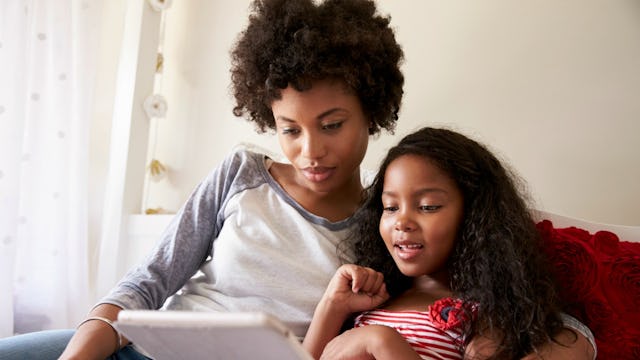I Don't Talk To My Child About Sad Or Upsetting News, And This Is Why

It was the scariest night of my life. I was 7 years old, and the police had just bombed a neighborhood in my hometown of Philadelphia, including houses with women and children inside. The entire block was on fire and I was frightened and worried that our house would be consumed by the flames, too.
I was too young to realize that the incident was miles away from where I lived and I was never in any danger that night at all. As a young girl, though, I had no concept of distance. All I knew was that something terrible was happening and I felt helpless and scared. My parents had no idea how much the incident was affecting me as they kept the television on all night long, watching the fire spread.
While the fire was the cause of a lot of stress in my little 7-year-old world, I also experienced a lot of little stresses. My parents had no filter or concept about kid-appropriate content. Over 30 years later, I’m still dealing with issues from various incidents that I was way too young to be privy to.
My daughter is 9-years-old, and is even more sensitive than I was growing up.
She doesn’t like to hear bad words or discussions about things like robbery or murder. She often covers her ears when she’s at her grandparent’s house and the news is on in the background. When Trump was elected, she cried and nearly hyperventilated. She was so scared about what would happen to our family and her friends.
We’re living in a time where kids are so much more aware of the environment around them. Terrible tragedies are forcing our young people to grow up a lot faster than they should have to. Youth from Marjory Stoneman Douglas High School should have been preparing for prom and graduation during the last school year. Instead, they were dealing with the aftermath of a school massacre and turning their pain into action to fight for gun control. Just teenagers, the chance of living normal young adult lives was taken from them. It’s just not fair.
It’s not fair that children in Flint, Michigan don’t have clean water to drink. Or that babies are being separated from their parents at the border. Instead of fun and games, so many children are dealing with pain and strife.
I tell my daughter about these things, about everything that’s going on, but not in real time. I rarely show her news programs. Instead I choose to ease her into understanding what’s going on in the world around us. She’s still a baby. She’s my baby, and I’m not willing to sacrifice my child’s innocence so that she can be “woke.”
Giving birth to my daughter as an underpaid single Black mother, I knew that there would be some struggles I would not be able to protect my baby girl from. I anticipated it. This country historically does not treat underpaid single Black mothers well. When I met my husband, moved, finally had the support I needed to change careers and move on up in the world, I vowed that I would do my best to be a shield to my daughter in the way that my parents weren’t able to be for me.
The whole “let them be little” movement wasn’t created with Black kids in mind. In fact, in the Girlhood Interrupted: The Erasure of Black Girls’ Childhood study by the Georgetown Law Center on Poverty and Inequality found that adults viewed black girls as “less innocent and more adult-like than white girls of the same age, especially between 5 – 14 years old.” The report goes on to say that black girls, like my daughter, need less protection, know more about adult topics, including sex, and don’t require as much support and comfort.
Well, fuck that.
I’m going to let my daughter be little for as long as she wants to be. I can warn her about strangers without giving her nightmares. We can talk about how to handle dangerous situations without me pounding it in her head or showing her graphic and frightening visuals. I don’t need to stress her out at 9-years-old under the guise of keeping her safe.
In fact, by doing those things, I could be putting her at risk for anxiety, depression, and mood disorders as an adult. Researchers from the University of Wisconsin–Madison discovered early life stress and the development of psychiatric disorders are related. Basically, kids who are stressed grow up to be adults who are stressed. Why would I do that to my own child if I don’t have to?
The unfortunate world we live in is rife with chaos and tragedy. It’s inevitable that at some point any of us will be in some personal proximity to darkness. Growing up as a person of color, the odds are ever in our favor for some incident or another. But while my daughter is still young enough for me to protect her, I will continue doing just that.